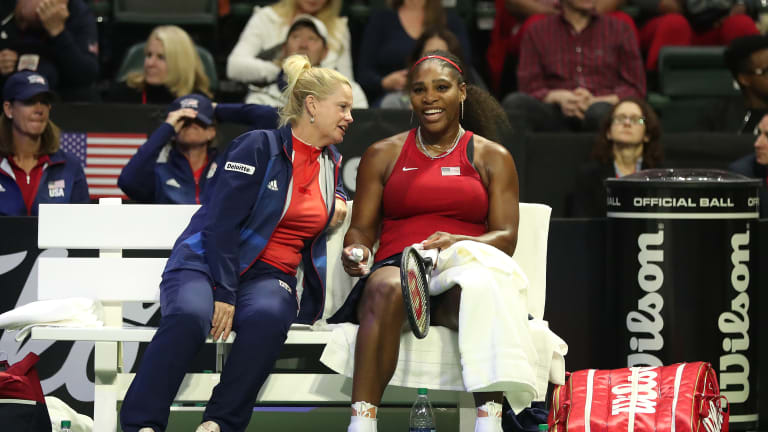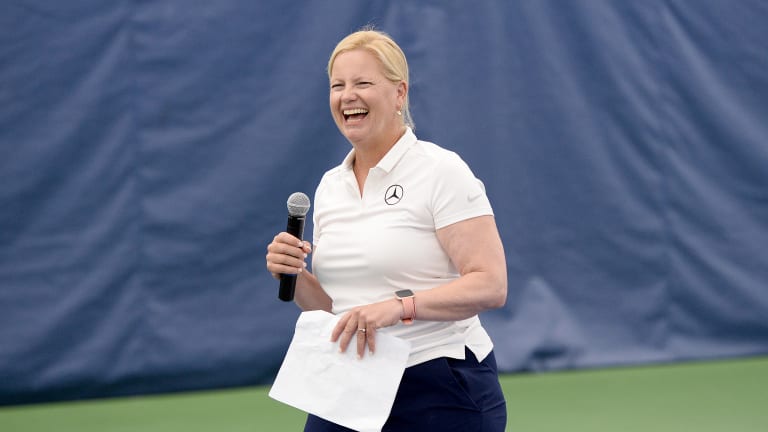Getty Images
In many ways, the Rinaldi coaching gestalt was established when she first began her USTA career. “When I started, I had to take a trip and pick a team to go to Bolton, England for a 14-and-under event,” says Rinaldi. “It was just an incredible experience, right off the bat. There’s so much more than just the tennis. There’s the organization, and the fitness, and all that’s part of the tennis. These girls were also still in school, so we had to make sure that was getting attention, and also that they were doing things like keeping a journal and sight-seeing.”
Keep in mind that by the time a junior of any age hits the USTA radar, she is likely one of the top 20 in the country of her age group—quite skilled, experienced and, most notably in Rinaldi’s case, under the tutelage of at least one private coach. Here is just one case where Rinaldi’s people skills proved vital. “You build trust and you listen,” she says. “You listen to what they’ve learned from the private coach. You talk to that coach, a lot. And you listen to what the player is feeling, to what their needs are. Every player is different. I would try to put myself in their shoes, to see what they were feeling.”
Be it at tournaments all over the world or at USTA training camps, Rinaldi’s commitment to American players is relentless. At a typical day of a Grand Slam event, it’s common to see her on the grounds at 7:00 a.m. to check out and conduct early morning practice sessions. Checking out the day’s schedule, Rinaldi ticks off all the matches she wants to watch up close, a non-stop itinerary of singles and doubles battles. If only one American is in action, Rinaldi might well take a seat in a corner of the player box and cheer the player on. Or, if she deems it more appropriate to be less visible, she’ll sit much further away from the player entourage. Should two Americans be going toe-to-toe, Rinaldi finds a distant neutral spot and stays silent.
Sprinkled through the practices and matches come a non-stop stream of text messages, phone calls, emails and highly personal conversations. In some cases, the dialogue focuses on the Xs and Os, Rinaldi’s keen knowledge of each player’s style surfacing. In others, the emphasis is much more maternal. As Sloane Stephens said several years ago in a 2018 New York Times article, “You give her a hug when you see her. It’s like she’s the tennis mom that you wish every tennis mom was like.”
Then again, anyone who’s been on a court with Rinaldi knows that she is a fierce and focused competitor, armed with crisp groundstrokes, sharp volleys and keen court sense. “I’m almost playing each and every point,” says Rinaldi. “I love to watch the competition, to see every point. I want to support them as much as I can. If I see something, I’ll mention it to the coach.”
And the coach is almost always certain to listen. “They respect what she’s done and the experience she’s had,” says Austin. “They know she’s been there, but she doesn’t bring an ego to it.”
Rinaldi credits her mother Lindi and father Dennis with helping her always stay grounded. “Tennis is tough,” says Rinaldi. “It’s not easy. I was blessed with wonderful parents and great hitting partners.”
Once a one-handicap golfer, Dennis saw a connection between the links and the courts that aided his daughter’s tennis. “The fundamentals of the two games are similar,” he said in a 1981 Sports Illustrated article. “They’re both swinging sports. Kathy and I work together. She tells me what she thinks, and if we disagree, we talk it over. She’ll give anything an honest try.”


